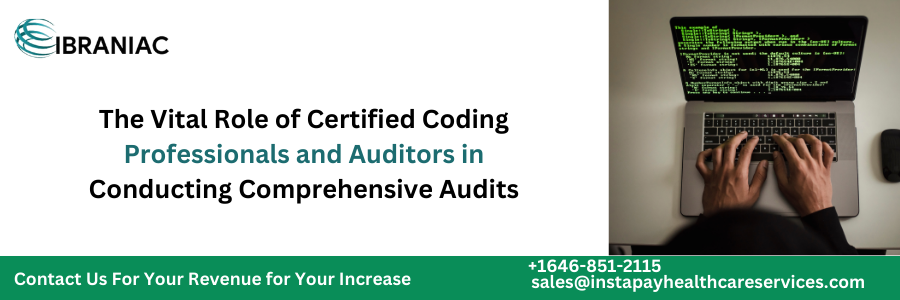
The Vital Role of Certified Coding Professionals and Auditors in Conducting Comprehensive Audits
by admin | May 14, 2024 | 0 comments,
1) Introduction :
In the tricky landscape of healthcare, correct medical coding is paramount. Certified coding specialists and auditors play a pivotal role in ensuring precision and compliance inside healthcare organizations. This blog delves into their critical contributions, highlighting their knowledge in undertaking comprehensive audits and illuminating the significance of their function in figuring out coding discrepancies and avenues for enhancement.
2) Understanding Certified Coding Professionals :
Certified coding experts are skilled people talented in assigning appropriate codes to diagnoses and techniques in medical information. They own in-intensity know-how of scientific terminology, anatomy, and coding suggestions, ensuring correct documentation and billing.
The Evolution of Medical Coding
Tracing the origins of medical coding from guide systems to fashionable digital health facts (EHRs). Exploring the transition from ICD-9 to ICD-10 coding structures and its impact on coding practices.
3) Skills Required for Certified Coding Professionals :
a) Proficiency in navigating coding manuals inclusive of ICD, CPT, and HCPCS.
b) Attention to detail and analytical prowess crucial for accurate code challenge.
c) Continuous learning and adherence to evolving regulatory requirements.The Role of Auditors in Ensuring Compliancen
Auditors complement the efforts of coding experts by way of engaging in thorough critiques to validate coding accuracy and compliance with regulatory requirements. Their understanding lies in identifying discrepancies and implementing corrective measures to mitigate risks.
4) Types of Audits Conducted by using Certified Professionals :
a) Prospective audits: Pre-emptive critiques conducted before claim submission to make certain compliance.
b) Retrospective audits: Post-fee assessments aimed at identifying coding errors and discrepancies.
5) Leveraging Technology in Auditing Processes :
a) Utilization of advanced software program solutions for automatic auditing and statistics analysis.
b) Integration of artificial intelligence and machine gaining knowledge of algorithms for enhanced accuracy and performance.
6) Unveiling the Impact of Comprehensive Audits :
Comprehensive audits orchestrated by way of licensed professionals yield multifaceted blessings for healthcare groups, ranging from revenue optimization to quality development initiatives.
7) Revenue Cycle Optimization :
a) Identification and rectification of coding errors cause expedited claim reimbursements.
b) Mitigation of compliance risks minimizes the chance of consequences and fines.
8) Quality Enhancement Initiatives :
a) Detection of documentation gaps enables targeted instructional interventions for healthcare providers
b) Insights garnered from audit findings inform process improvements and enhance basic healthcare delivery.
FAQs (Frequently Asked Questions)
What qualifications are required to turn out to be a certified coding professional?
To become an authorized coding professional, individuals usually pursue specialized training packages and acquire certification from recognized accrediting bodies including the American Academy of Professional Coders (AAPC) or the American Health Information Management Association (AHIMA).
How do auditors ensure compliance during the audit process?
Auditors meticulously assessment medical documentation, move-referencing coded statistics with affected person statistics to make certain alignment with coding recommendations and regulatory necessities.
Can automated auditing tools replace human auditors entirely?
While automatic auditing gear offer efficiency gains, human auditors stay integral for nuanced critiques requiring contextual expertise and interpretation.
What measures can healthcare organizations take to prepare for comprehensive audits?
Healthcare corporations can put in force robust documentation development programs and spend money on ongoing education for coding experts to uphold coding integrity and compliance.
What are the repercussions of coding discrepancies identified during audits?
Coding discrepancies identified for the duration of audits can bring about claim denials, sales loss, and capability legal ramifications, underscoring the significance of proactive auditing practices.
How do comprehensive audits contribute to the enhancement of patient care?
Comprehensive audits facilitate the identification of areas for improvement in documentation and coding accuracy, in the long run contributing to improved clinical documentation and patient effects.
Conclusion
Certified coding professionals and auditors function custodians of coding integrity within healthcare corporations, wielding their know-how to behavior comprehensive audits and uphold regulatory compliance. Through meticulous critiques and corrective interventions, they guard revenue integrity and foster non-stop best development in healthcare delivery. Embracing their pivotal function is imperative for businesses desiring to navigate the complexities of modern healthcare with precision and efficacy.